Philip French, who was the Observer’s film critic for 35 years, has died. Following several years of ill health, French suffered a heart attack on Tuesday morning at the age of 82.
He is survived by his wife, Kersti, sons Sean, Patrick and Karl, and 10 grandchildren.
French became one of the country’s best-loved film writers after becoming the chief critic at the Observer in 1978 following a distinguished career at the BBC.
He was named the British Press Awards Critic of the Year in 2009 and given an OBE in the 2013 New Year Honours for services to film. Later that year, when he turned 80, French retired from his position at the Observer, but continued to write every week for the paper.
Observer editor John Mulholland said he was “a giant figure” in the paper’s history and “part of its soul for the past 50 years”.
“He was a brilliant critic whose erudition and judgement were respected by generations of cinema lovers and film-makers alike. He was also a joy to work with, unfailingly warm and generous to colleagues and to the thousands of readers he encountered. He is revered as one of the most astute critics of his generation, whose love of film shone through his lucid and engaging writing. He will be missed sorely, but he will be remembered with affection and respect by his legion of admirers.”
Speaking to the Guardian this morning, his son Sean remembered a man who took seriously his role as a cultural commentator, “pointing people to the excitement and pleasure of the cinema and guiding them to what he thought was important”.
“He was extremely moral about his work. He didn’t see it in any frivolous way. One of the most shocking things to him was the idea of leaving a screening before the credits had rolled. It was one of the worst signs of decadence.”
Even in his final years, French continued his passion for cinema, watching even more movies than when a full-time reviewer.
“He was never going to be one to dig the garden,” said Karl. “And so while being immobile would be catastrophic for some people, keeping his mind alert was what mattered.”
“I think he’d be very happy to be remembered as a film critic,” said Patrick. “He thought it was useful. Right up to day he died, he did what he loved.”
French was born in Liverpool in 1933. He developed an early love of movies – westerns and musicals in particular – as an antidote to bleak, post-war Britain. Even when unfashionable, he championed Hollywood product right through his career.
Employed as a radio producer by the BBC from 1959, French spent a lot of time in America and was highly-knowledgable about US politics as well as culture.
He began his writing career as a reporter for the Bristol Evening Post in 1967 before working as a theatre critic at the New Statesman. French went full-time at the Observer in 1978, a paper for which he started writing in 1963.
Fellow journalists have paid tribute to the writer, with Guardian film critic Peter Bradshaw calling him “a great cinephile and a lovely man” and the Times’s Kate Muir a “wonderful, erudite film critic”. Others praised his “immense warmth, wit and good humour” and well as his generosity and eagerness to share his knowledge.
Mark Kermode, who took over as chief Observer film critic in 2013, said:
Philip’s noble, erudite writing elevated film criticism to the level of art. His judgement was acute but always generous, his prose beautiful, his knowledge breathtaking. He was an inspiration to an entire generation of film critics, and was always wonderfully supportive of his colleagues; encouraging, wise and kind. He is irreplaceable.
Sean said that his father was much like the man readers encountered on the page: erudite, enthusiastic and playful.
“If readers felt they knew him it’s because he put his personality into the writing. He was a very funny man, with a slightly grim comic view of the world and this obsessive thing about puns.”
One of the lines of which French remained most proud, he recalled, was the opening line of an essay on British cinema and the Post Office: “I don’t know much about philately, but I know what I lick.”

Comments (…)
Sign in or create your Guardian account to join the discussion